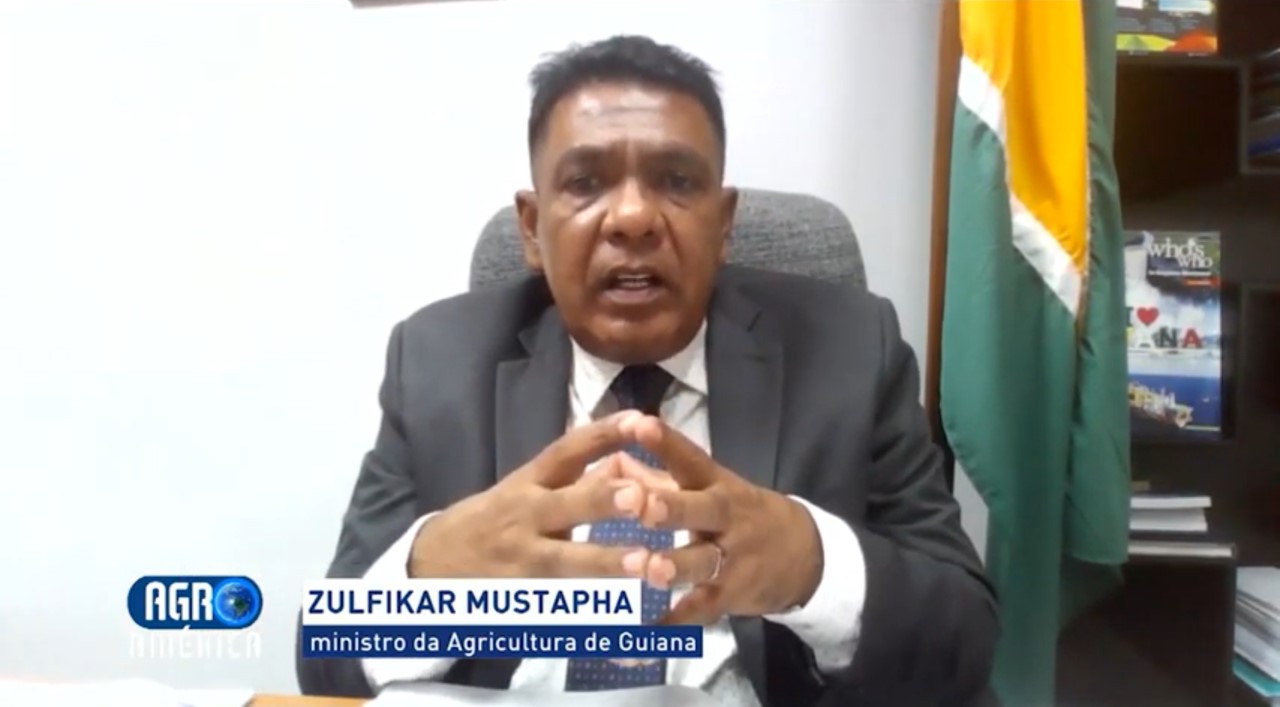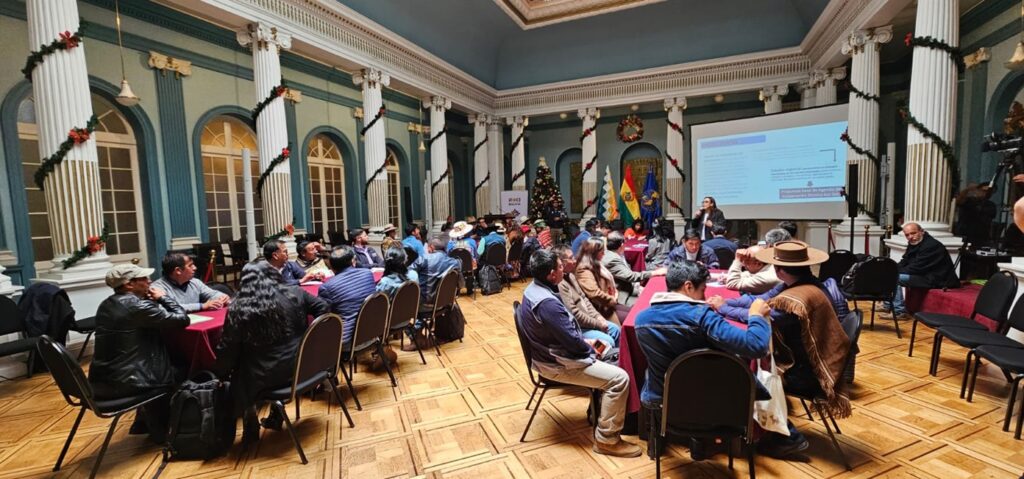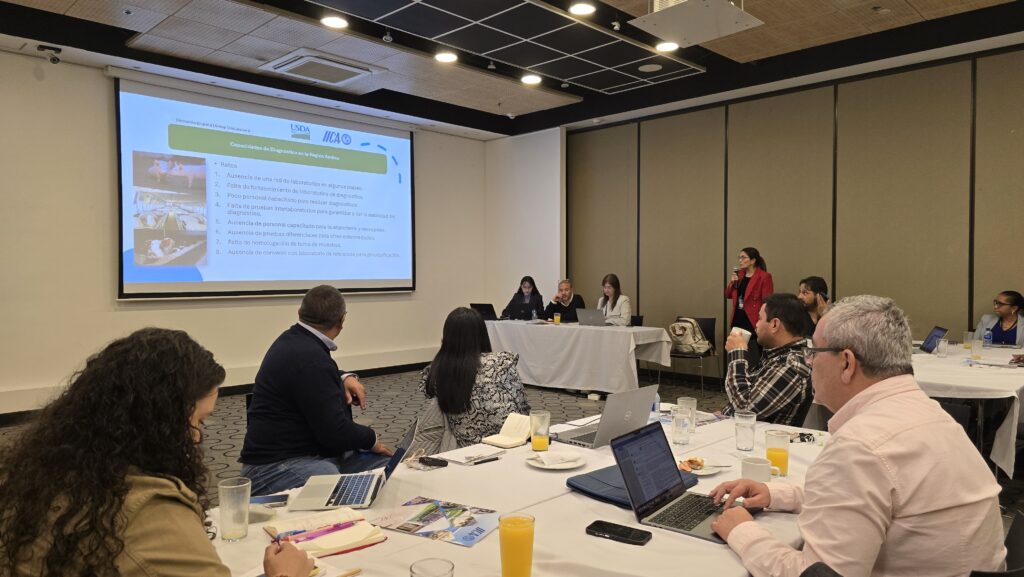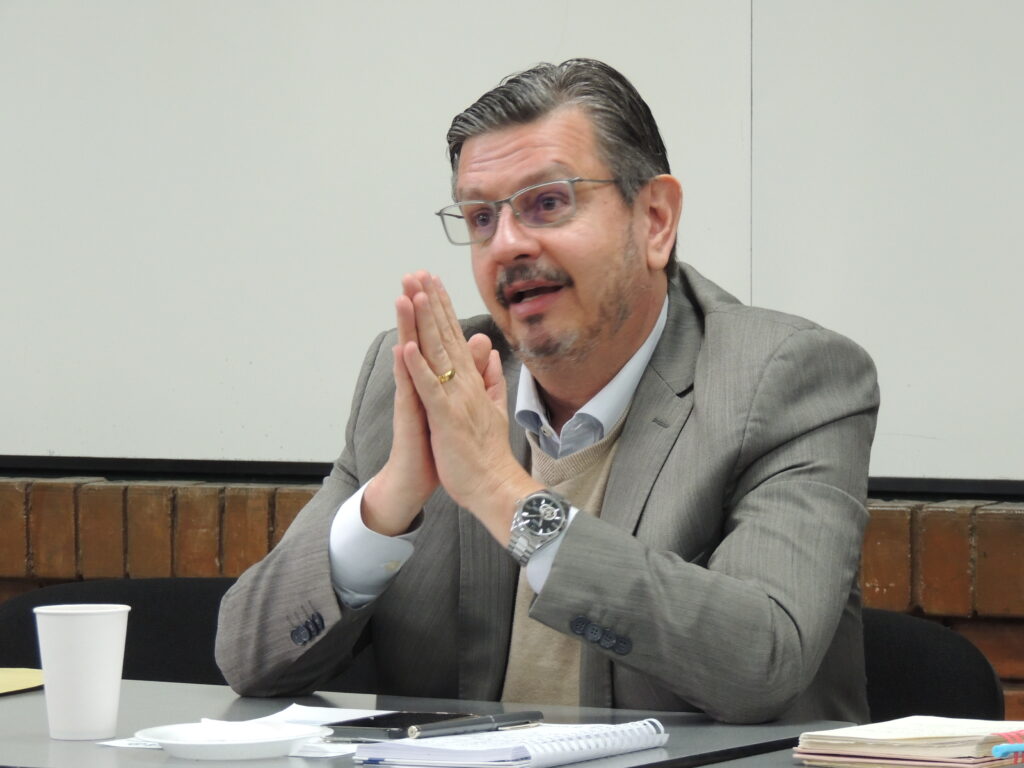El país sudamericano, considerado la canasta de alimentos del Caribe, espera este año la mayor cosecha de arroz de su historia y tiene la expectativa de lograr un aumento en la producción de azúcar, mientras trabaja para desarrollar producciones no tradicionales en su territorio.

Brasilia, 14 de abril de 2021 (IICA). Guyana busca aumentar su producción agrícola para fortalecer la seguridad alimentaria, mejorar la rentabilidad de sus pequeños productores y abrir nuevos mercados de exportación que generen divisas.
El país sudamericano espera este año la mayor cosecha de arroz de su historia y también tiene la expectativa de lograr un aumento en la producción de azúcar, mientras trabaja para desarrollar producciones que no son tradicionales en su territorio, como soja y maíz, de manera ser autosuficientes tanto en la provisión de proteínas como en la generación de alimentos para la industria avícola.
El ministro de Agricultura guyanés, Zulfikar Mustapha, se refirió de esa manera a las perspectivas agrícolas de su país durante una entrevista que concedió, desde Georgetown, al programa Agro América, que se emite por el canal brasileño de TV Agro Mais.
“Nuestros principales cultivos son arroz y azúcar. Exportamos los dos en gran escala a Europa, Norteamérica, Centroamérica e incluso al Caribe. El año pasado vimos una revalorización y recapitalización de la producción de azúcar y estamos cerca de reabrir cuatro establecimientos azucareros que estaban cerrados, para dar trabajo y aumentar la producción. Nuestro objetivo es pasar de las 88.000 toneladas producidas en 2020 a 100.000 toneladas este año”, detalló Mustapha.
“También hemos logrado un incremento en nuestra producción de arroz y vemos un gran potencial para este año. Esperamos tener la mejor zafra en la historia de nuestro país y buscamos más mercados alrededor del mundo. Tenemos dos nuevos compradores que son Hungría y Letonia y estamos negociando con Brasil para aumentar nuestra oferta para ese país de 10.000 toneladas a 34.000”, agregó.
El ministro reveló que se planea la construcción de un puerto de aguas profundas y el desarrollo de la conexión ferroviaria con Brasil para mejorar las condiciones comerciales. “Los beneficios –anticipó- serán enormes para ambos países, especialmente para nosotros. Queremos que desde el estado brasileño de Roraima haya una vía ferroviaria para que vengan a buscar nuestros productos, en lugar de ir hasta el Océano Pacífico”, expresó.
Mustapha también contó que Guyana está haciendo un esfuerzo para desarrollar la ganadería, a la que considera clave para la seguridad alimentaria y para generar divisas: “Estamos construyendo mataderos modernos en todo el país, para desarrollar nuestra industria de carne vacuna y porcina. Nuestro objetivo es procesar cerdos en nuestro país, antes de importarlos. Brasil exporta carne a Oriente Medio y nosotros también queremos entrar a esos mercados. En la producción de carne aviar somos autosuficientes, pero queremos exportar. Estamos invirtiendo mucho, investigando y construyendo laboratorios. Tenemos pasturas, abundancia de tierras y podemos decir que la ganadería en Guyana está despegando. En algunos años seremos una potencia en esta parte del mundo”, anticipó.
Durante la entrevista, el ministro guyanés valoró el rol de la cooperación internacional y enfatizó la importancia de la tarea del Instituto Interamericano de Cooperación para la Agricultura (IICA): “Tiene un papel muy relevante para nosotros y estamos convencidos de que podemos obtener muchos beneficios gracias a su colaboración, no sólo en Guyana sino en todo el Caribe. Guyana es una líder agrícola en la región. Ha sido llamada ‘la canasta de alimentos del Caribe’, por sus grandes superficies de tierras y su potencial agrícola”.
El impacto de la pandemia y la presión que significó sobre el sector agrícola fue otro de los temas de la charla. En todo el mundo, Covid-19 puso en primer plano la importancia de los agricultores familiares para garantizar la seguridad alimentaria y la calidad nutricional. En ese sentido, Mustapha dijo que el gobierno guyanés se fijó como prioridad la protección y el apoyo a los pequeños productores: “Muchas personas dependen de la agricultura para sobrevivir. Estamos trabajando para facilitar el acceso a los mercados de los pequeños productores. Tenemos en Guyana una gran compañía que produce jugos y estamos procurando que los agricultores familiares cuenten con precios preferenciales para venderles sus productos. El sector privado está trabajando con nosotros para apoyar a los productores y cooperativas de nuestro país”.
El ministro también se refirió a la importancia de la inclusión digital y de la incorporación de la tecnología. La cartera a su cargo se propuso comprar equipamiento electrónico para los pequeños productores. “Un agricultor de una zona remota –dijo Mustapha- podrá así enviar información a la ciudad, para que podamos ayudarlo, extendiendo los servicios de Georgetown al interior. Veremos una revolución tecnológica en la agricultura, pero para ello hay que equipar y capacitar a los agricultores. Vamos a ayudarlos a adquirir drones para que puedan controlar sus plantaciones y aplicar los productos fitosanitarios”.
Guyana es un país muy proactivo en cuanto a las políticas de mitigación y adaptación de cambio climático.
Mustapha dijo que el país ha desarrollado una estrategia de reducción de carbono, que le permite vender bonos a diferentes partes del mundo gracias al oxígeno generado por sus bosques. Pero, a su vez, es muy vulnerable al impacto del cambio climático, reconoció el ministro.
“Guyana está por debajo del nivel del mar –explicó- y tenemos altos índices de lluvia, por lo que padecemos reiteradas inundaciones. Estamos implementando mecanismos para aliviarlas. Es un tema muy serio”, indicó.
El ministro destacó, finalmente, la cantidad de ríos en Guyana. De hecho, la que da nombre al país es una palabra de origen indígena que significa “tierra de muchas aguas”.
“Tenemos –dijo el ministro- abundancia de agua dulce. En ninguna parte de nuestro país el agua escasea. Considerando nuestra superficie, contamos con la mayor cantidad de agua dulce per cápita del mundo. De todas maneras, estamos analizando diversas partes del país para asegurar que la gente tenga suficiente acceso a agua para consumo y para riego. El agua está disponible pero debemos instalar los mecanismos para garantizar que llegue a las comunidades y es lo que estamos haciendo”.
Agro América es un programa del canal brasileño de TV Agro Mais, del Grupo Bandeirantes de comunicación, fruto de una alianza con el IICA.
La emisión presenta la actualidad del sector agropecuario y la ruralidad en los países miembros del IICA, con el objetivo de promover el intercambio de experiencias y una discusión sobre desafíos y oportunidades de América Latina y el Caribe en el área de desarrollo agropecuario y rural.
Más información:
Gerencia de Comunicación Institucional del IICA.
comunicacion.institucional@iica.int










